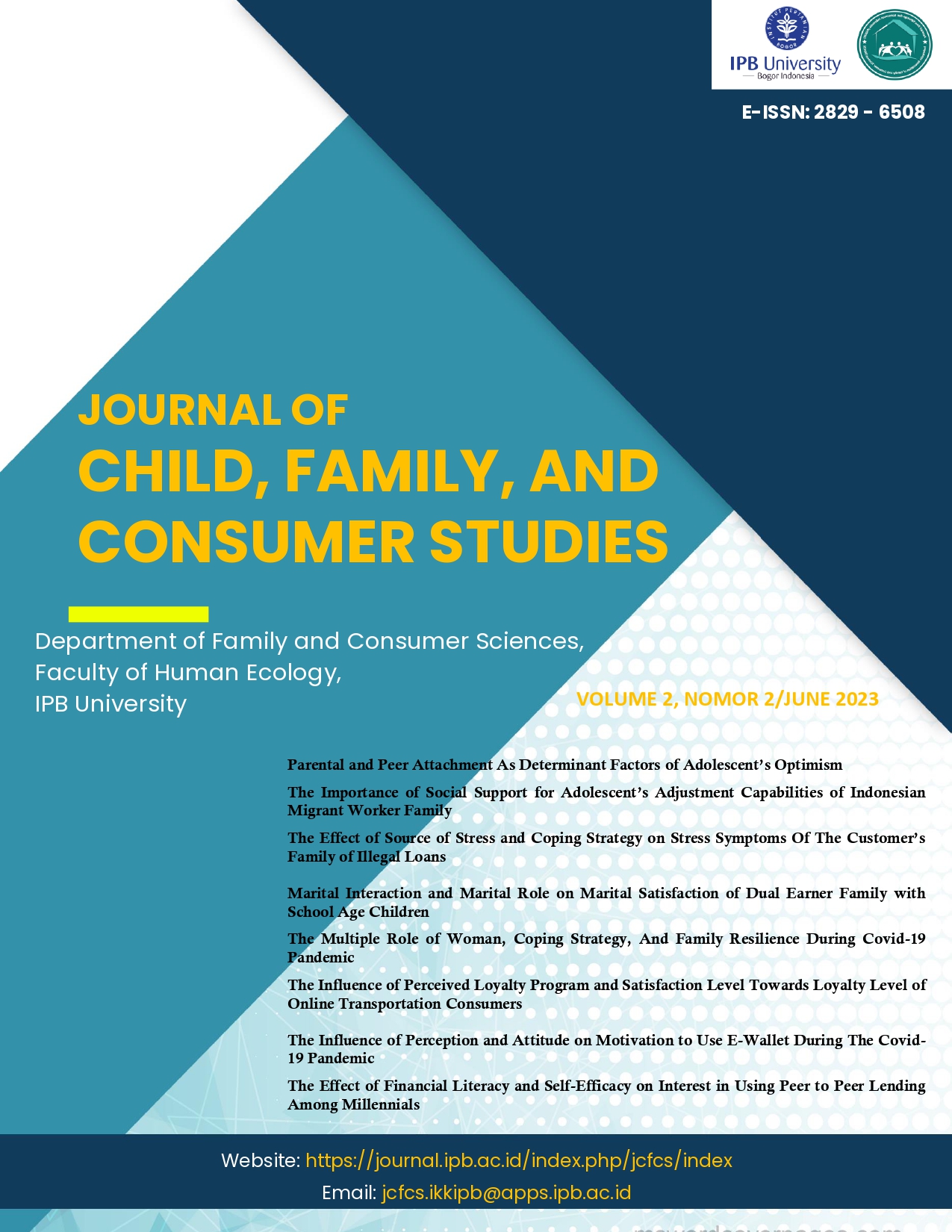MARITAL INTERACTION AND MARITAL ROLE ON MARITAL SATISFACTION OF DUAL EARNER FAMILY WITH SCHOOL AGE CHILDREN
Abstrak
Lack of interaction and communication between husband and wife in various aspects of family life will cause conflict and disharmony. The purpose of the study was to identify interactions, husband-wife roles, and marital satisfaction of dual earner families with school children. The study involved 60 families consisting of 30 husbands and 30 non-partnered wives who are workers in Bandung Regency, West Java. Data were collected online using voluntary sampling technique. Husband-wife interaction was in the moderate category, husband-wife roles were in the low category for husbands and moderate for wives, and marital satisfaction was in the moderate category. The correlation test results show that there is a positive significant relationship between family income, husband-wife interaction, and husband-wife roles with marital satisfaction. The regression test results show that age, husband-wife interaction, the bonding and balanced relationship dimensions of the husband-wife interaction variable, and the social activity dimension of the husband-wife role variable have a positive effect on marital satisfaction. In increasing marital satisfaction, husband and wife are expected to be good at managing emotions, adjusting themselves, maintaining conjugal interactions, strengthening bonding and balanced relationships, and carrying out social activities.
Referensi
Abbott, M., R. (1992). Masculine and Feminine. Edisi 2. New York : McGraw-Hill. Inc.
Allendorf, K., & Ghimire, D. J. (2013). Determinants of marital quality in an arranged marriage society Social science research, 42(1), 59-70. https://doi.org/10.1016/j.ssresearch.2012.09.002
Anggraeni, R. A. (2012). Pola relasi suami istri terkait dengan pembagian kerja dan pengambilan keputusan (studi kasus terhadap tiga keluarga dalam perubahan peran di keluarga). Skripsi Program Studi Sosiologi Universitas Indonesia.
Askari, Z. (2016). Forgiveness and its relationship with marital satisfaction: a sectional study. The International Journal of Indian Psychology, 3(3), 84-90.
Ashwini, U. R. (2018). Work-Life balance and Marital Satisfaction among working Men and Women. International Journal of Research and Analytical Reviews, 5(4), 988-992. http://ijrar.com/upload_issue/ijrar_issue_20542495.pdf
Arifain, S. M. K., Yusof, F., Aziz, S., Suhaini, N., & Suhaini, N. (2021). The Influence of Social Support on Marriage Satisfaction among Working Women in Selangor, Negeri Sembilan And Melaka.
Azeez, E. P. (2013). Employed women and marital satisfaction: A study among female nurses. International Journal of Management and Social Sciences Research, 2(11), 17-26.
Chuang, Y. C. (2005). Effects of interaction pattern on family harmony and well-being: Test of interpersonal theory, Relational-Models theory, and Confucian ethics. Asian journal of social psychology, 8(3), 272-291. https://doi.org/10.1111/j.1467-839X.2005.00174.x
Diah, W. K., & Chotimah, K. (2017). Peran regulasi emosi dalam kepuasan pernikahan pada pasangan suami istri usia dewasa awal. Jurnal Ecopsy, 4(1), 58-63. Doi: 10.20527/ecopsy.v4i1.3417
Duvall, E. M., & Miller B. (1985). Marriage and Family Development. Harper & Row.
Fowers, B. J., & Olson, D. H. (1993). Enrich marital satisfaction scale: A reliability and validity study. Journal of Family Psychology, 7(2), 176-185. https://psycnet.apa.org/doi/10.1037/0893-3200.7.2.176
Gottman, J. M., & Krokoff, L. J. (1989). Marital interaction and satisfaction: a longitudinal view. Journal of consulting and clinical psychology, 57(1), 47. https://psycnet.apa.org/doi/10.1037/0022-006X.57.1.47
Herawati, T., Zubairi, B. K., Musthofa, M., & Tyas, F. P. S. (2018). Dukungan sosial, interaksi keluarga, dan kualitas perkawinan pada keluarga suami istri bekerja. Jurnal Ilmu Keluarga & Konsumen, 11(1), 1-12. https://doi.org/10.24156/jikk.2018.11.1.1
Jackson, A. (2014). Associations among marital satisfaction, sexual satisfaction, conflict frequency, and divorce risk from 1980 to 2000 (Doctoral dissertation).
Jose, O., & Alfons, V. (2007). Do demographics affect marital satisfaction?. Journal of Sex & Marital Therapy, 33(1), 73-85. doi:10.1080/00926230600998573.
Krzaklewska, E. (2014). Measurement of Gender Equality: Analysing Dimensions, Embracing Areas, Considering Contexts. Gender Equality and Quality of Life–State of Art Report, (1):1–33. http://www. geq. socjologia. uj. edu. pl/documents/32447484/75036585/WP1, 2.
Larasati, A. (2013). Kepuasan perkawinan pada istri ditinjau dari keterlibatan suami dalam menghadapi tuntutan ekonomi dan pembagian peran dalam rumah tangga (Doctoral dissertation, UNIVERSITAS AIRLANGGA).
Lasswell, M., & Lasswell, T. (2002). Marriage & The Family. California: California Publishing Company.
Maulana, Z. M. A. (2019). Pengaruh Pembagian Peran dan Kontribusi Ekonomi Istri terhadap Kesejahteraan Subjektif Keluarga Dual Earner di Kota Bogor.
Nurpratiwi, A. (2010). Pengaruh kematangan emosi dan usia saat menikah terhadap kepuasan penukahan pada dewasa awal. [skripsi]. UIN Syarif Hidayatullah, Jakarta
Megawangi, R. (1999). Membiarkan berbeda?: Sudut pandang baru tentang relasi gender. ATF Press.
Ochsner, T. J. (2012). The impact of dual-career marriage on role conflict and marital satisfaction.
Puspitasari, N., Puspitawati, H., & Herawati, T. (2013). Peran gender, kontribusi ekonomi perempuan, dan kesejahteraan keluarga petani hortikultura. Jurnal Ilmu Keluarga & Konsumen, 6(1), 10-19. https://doi.org/10.24156/jikk.2013.6.1.10
Puspitawati, H. (2012). Gender dan Keluarga: Konsep dan Realita Indonesia. Pt Penerbit IPB Press. Puspitawati, H. 2013. Pengantar Studi Keluarga. Bogor: IPB Press.
Rahmaita, R., Krisnatuti, D., & Yuliati, L. N. (2016). Pengaruh tugas perkembangan keluarga terhadap kepuasan perkawinan ibu yang baru memiliki anak pertama. Jurnal Ilmu Keluarga & Konsumen, 9(1), 1-10. https://doi.org/10.24156/jikk.2016.9.1.1
Rizkillah, R. (2013). Masalah dan Konflik Kerja-Keluarga serta Strategi Penyeimbangan pada Keluarga dengan Suami Isteri Bekerja.
Santrock, J. W. (2007). A topical approach to life-span development, 3E. Ch, 5, 192.
Sari, A. N., & Fauziah, N. (2017). Hubungan antara empati dengan kepuasan pernikahan pada suami yang memiliki istri bekerja. Jurnal Empati, 5(4), 667-672. https://doi.org/10.14710/empati.2016.15432
Srisusanti, S., & Zulkaida, A. (2013). Studi deskriptif mengenai faktor-faktor yang mempengaruhi kepuasan perkawinan pada istri. UG journal, 7(6).
Soekanto, S. (2002). Teori Peranan. Bumi Aksara. Jakarta.
Suryani. (2008). Perbedaan kepuasan perkawinan pada wanita bekerja dan wanita tidak bekerja. Skripsi. Fakultas Psikologi Universitas Indonesia Jakarta.
Tyas, F. P. S. (2017). Pengaruh Kesiapan Menikah dan Tugas Perkembangan Keluarga terhadap Kepuasan Pernikahan pada Keluarga Menikah Dini (Doctoral dissertation, Bogor Agricultural University (IPB).
Wheatley, D. (2014). Travel-to-work and subjective well-being: A study of UK dual career households. Journal of Transport Geography, 39, 187-196. https://doi.org/10.1016/j.jtrangeo.2014.07.009
Zulkaida, A. (2013). Studi deskriptif mengenai faktor-faktor yang mempengaruhi kepuasan perkawinan pada istri. UG journal, 7(6).
![]() This work is licensed under a Creative Commons Attribution 4.0 International License.
This work is licensed under a Creative Commons Attribution 4.0 International License.













